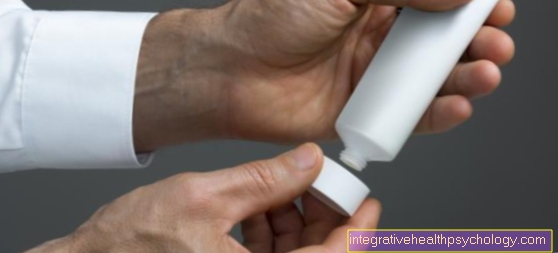
Inflammations in the area of the gluteal folds / anal folds are not uncommon. Most people who go to a proctology doctor's office because of symptoms like this do so because of skin problems around the anus. In most cases, these skin problems are caused by inflammatory processes. Possible causes for the development of an inflammation at the pelvis / buttock fold range from simple hemorrhoidal diseases to extensive fistulas. In addition, allergies or neurodermatitis can lead to inflammation of the gluteal folds.

In most cases, the inflammatory processes in the anal region cause pronounced discomfort in the affected patient. Typical symptoms of inflammation around the gluteal folds include severe itching, burning pain, and oozing, sore skin.
$config[ads_text1] not found
In general, inflammatory skin manifestations in the area of the gluteal folds are divided into three groups:
The most common cause of inflammation in the gluteal folds is what is known as "hemorrhoidal disease". The term hemorrhoids is understood to mean the enlargement of the vascular cushion in the area of the rectum caused by a congestion of blood. Due to the increasing size of individual vessels, these sink down and emerge from the intestinal canal. The pathological change in the vascular cushion can have different degrees of severity, depending on the individual affected.
Although the subject of "hemorrhoids" is taboo in society and is therefore often kept secret, one can assume that around 50 percent of German citizens suffer from such vascular changes.
The causes for the development of this disease are diverse. Long-term high pressure on the anal area is the most important risk factor for the occurrence of hemorrhoids with the associated inflammation of the gluteal folds. Such a pressure increase can be caused, for example, by persistent blockages (Constipation) and / or strong straining during bowel movements. Furthermore, factors such as frequent sitting, obesity and lack of exercise are also risk factors for the development of hemorrhoids, which can lead to inflammation of the gluteal folds. Genetic influences (Inheritance) seem to play a certain role in the development of the disease.
$config[ads_text2] not foundIn addition to hemorrhoid disease, inflammation of the gluteal folds can also be associated with atopic disease. Atopic anal eczema (a variant of neurodermatitis) is the second most common cause of inflammation in the gluteal folds.
In addition, bacterial skin infections or fungal infections can lead to inflammation of the gluteal folds.
If the gluteal folds are inflamed, the symptoms typical of inflammatory processes appear. The entire skin surface of the buttock fold is clearly reddened in the affected patients. In addition, when the gluteal folds are touched, a strong warming of the skin can be detected. If the inflammation at the pelvis / buttock fold is due to a pathological change in the anal vessels (hemorrhoidal disease), local skin irritation and itching occur quite early on in those affected. In addition, the mucous membrane can be injured directly on the hemorrhoid. In most cases, these are noticed because blood deposits can be found on the toilet paper after wiping it off. With pronounced hemorrhoids, these blood deposits can even stick to the stool. Due to the insensitivity of the anus mucous membrane to pain, pain in 1st degree hemorrhoids can be completely eliminated. For this reason, pain usually only occurs when the vessels bulge out of the anal canal (2nd degree hemorrhoids).
$config[ads_text2] not found
$config[ads_text3] not foundRead more on the topic Anus itch
Atopic anal eczema, on the other hand, which can lead to inflammation of the gluteal folds, tends to cause repeated itching over many years. In addition, this cause of inflammation on the gluteal folds also shows a pronounced skin change (for example reddening and / or flaking).
In the case of fungal diseases associated with inflammation of the gluteal folds, white-yellowish deposits can often be observed.
Those affected by inflammation usually feel pain at the gluteal folds when they sit or lie on this spot.
In addition, clothing can also cause pain due to friction.
Pain caused by hemorrhoids usually occurs when going to the toilet or pressing. It is mostly a burning pain.
If there is a boil (abscess), the pain is particularly pronounced when it is touched or pressed.
Read more on the topic: Pain in the buttocks
An abscess in the gluteal fold or anus is relatively common, although the exact cause has not been clarified with certainty.
The inflammation is usually caused by ingrown hairs, but can also occur as an accompanying disease in Crohn's disease, a chronic inflammatory bowel disease.
An abscess is a bump filled with pus that a bacterial infection causes in this area.Patients feel severe pressure pain when sitting and prefer to stand.
An abscess usually has to be treated surgically. This is done under general anesthesia, as it is very painful to cut open an abscess in the anal area. The abscess is cut out and rinsed. A drain is usually placed so that the wound fluid can drain away. In order to heal the inflammation, the wound is usually left open.
Post treatment of an abscess takes some time. The open wound will need to be checked regularly by a doctor to make sure the inflammation goes down. It can take one to two months for the wound to close. However, symptoms improve early and the severe pain usually disappears immediately after the operation.
$config[ads_text4] not found
Read more on the topic: Abscess on the buttocks
The diagnosis of inflammation on the gluteal fold is carried out in several steps.
The detailed one Doctor-patient conversation (anamnesis) represents the most important step. During this conversation the patient concerned should describe the perceived complaints to the attending physician as precisely as possible. The description of the symptoms at hand can help to narrow down the possible causes of the inflammation in the gluteal folds.
The doctor-patient discussion is usually followed by a symptom-oriented discussion physical examination. During this examination, the buttock region is first inspected. The attending doctor pays particular attention Skin appearances, scars and swelling. In addition, the anus is examined for the possible presence of hemorrhoids.
The so-called "Digital rectal exam“Plays a crucial role in diagnosing inflammation in the gluteal folds. During this examination, the attending physician asks the patient to push as if they had a bowel movement. In this way, the short-term escape of low-grade hemorrhoids from the rectum can be provoked. The anal canal must then be scanned with a finger and examined for abnormalities.
In addition, various smears and blood tests can help rule out bacterial causes for the development of the inflammation at the pore or bottom fold. Also Fungal infections are often diagnosed with a specific smear.

Treatment of inflammation in the gluteal folds depends primarily on the underlying condition. In most cases, patients who have been diagnosed with hemorrhoidal disease are treated immediately. The so-called basic therapy is primarily concerned with avoiding or delaying the progression of the existing symptoms.
A classic measure of this basic therapy is the intake of medication that affects the consistency of the stool and in this way enables rapid bowel movement. Affected patients should also ensure they are drinking enough fluids and eating foods rich in fiber. Exercise can also help prevent constipation.
$config[ads_text1] not foundThe itching caused by hemorrhoids and inflammation on the gluteal folds can be relieved by regular use of so-called "hemorrhoidals". These substances are drug complexes that are used exclusively for the treatment of hemorrhoidal symptoms. Applying an ointment regularly can help relieve both the itching and possible pain. In addition, the inflammation caused by the hemorrhoids on the gluteal folds demonstrably diminishes when the hemorrhoids are used. Most of the over-the-counter hemorrhoidals come in the form of ointments or suppositories. Grade 1 and 2 hemorrhoids, which can cause inflammation of the gluteal folds, can also be treated by infusing special fluids into the hemorrhoidal node. The solutions used have active ingredients that lead to localized inflammatory reactions and thus provoke the shrinking of the hemorrhoids.
Pronounced hemorrhoids, which can lead to inflammation of the gluteal folds, cannot usually be treated with these non-surgical treatment measures. For this reason, surgical treatment must be initiated in the affected patient. Anal eczema, on the other hand, which leads to inflammation of the gluteal folds, requires treatment with special cortisone preparations. In most cases, the active ingredient is used in the form of ointments or creams. Ointments containing cortisone inhibit the inflammatory processes and in this way accelerate the natural healing process.
The duration can vary depending on the cause of the inflammation. If it is a fungal disease or neurodermatitis, these can be treated within a few days so that the symptoms disappear.
If patients suffer from hemorrhoids, these symptoms can be treated within 1-2 weeks and the symptoms improved. However, there is a chance that the hemorrhoids and the associated pain and itching will reappear.
In the case of an abscess or a fistula (a small passage that leads from a cavity or hollow organ to the surface of the skin) in the buttocks area, it can take a few weeks or months to heal, with suitable therapeutic measures.
The prognosis for inflammation of the gluteal fold depends on the causal disease as well as on the time at which the therapy was started. If an inflammation of the gluteal fold is diagnosed early and appropriate treatment initiated promptly, the prognosis is extremely good. Complications can be more likely with inflammation of the gluteal folds Rare to be watched. However, there is, depending on the causal disease, the possibility that the inflammatory processes occur Neighboring structures spread.

Hemorrhoids are swellings of the vascular plexus in the rectum. Hemorrhoids can be associated with different symptoms, depending on their severity.
Here you get to the topic: Hemorrhoids
Hemorrhoids can be associated with severe discomfort. Treatment can be beneficial to counteract the symptoms.
Here you get to the topic: Treating hemorrhoids successfully

There are different types of skin fungi, which mainly differ in their appearance. A fungal attack is usually based on a disruption in the natural barrier function of the skin.
Here you get to the topic: Skin fungus

Anal eczema is inflammation of the skin on the anus. It can occur, among other things, in the context of various skin diseases.
Here you get to the topic: Anal eczema